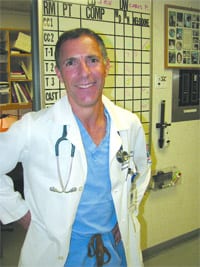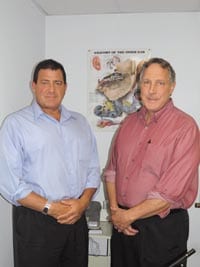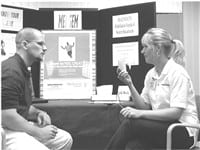Variety Is the Spice of His Life This Emergency-room Physician Wears Many Different Hats — and All of Them Fit
When Dr. Richard Gerstein came to Ware’s Mary Lane Hospital in 1989 for service as an emergency-room physician, he arrived with expectations that his would be a relatively short stay.
“I really didn’t anticipate being here long,” he told The Healthcare News. “I thought I’d get my feet wet and then move on to something bigger and better.”
But 20 years later, Gerstein is still reporting for work every day at 85 South St., longevity he attributes to some circumstances and resulting opportunities — first to become director of Emergency Services at the small, 31-bed hospital only a few years after arriving, and then director of Medical Affairs — and eventually to the realization that, while there were certainly bigger things out there career-wise, it was going to be quite hard to find something better.
Indeed, Gerstein practically gushes as he talks about how much he enjoys the blend of medicine and administrative work that comprises a ‘typical day’ for him at Mary Lane, and thus turns that phrase into a oxymoron.
“There’s simply no such thing as a typical day for me,” he explained, noting that, some days, the bulk of his time is spent in meetings and the boardroom, while other times, his hours are spent mostly treating patients in the ER, which, he says, is decidedly different than a more urban emergency department (more on that later). “Nothing can ever get stale; each day is interesting and challenging and exciting, and that’s why I’m still here.
“One day I’m doing administrative work,” he continued, “ while another day I’m in the Emergency Department, and sometimes, during the same day, I’m an administrator, but it’s so busy in the ER that I put on my ER clothes and become an ER doctor. You never know how things will unfold.”
And with that, The Healthcare News presents a day in the life of a doctor who wears many different hats, and is comfortable — and pleasingly challenged — in each one.
Patients Are a Virtue
As he talked about life in Mary’s Lane ER, Gerstein found himself measuring his words, trying, as he uttered them, not to stereotype or in any way demean people from the suburban Ware/Palmer area — or, for that matter, those who live in more-urban settings.
Yet he still managed to get across his main point — that his emergency room is different from those found in Springfield, Holyoke, or even Northampton. “I’d have to say that patients are more appreciative of the care they receive here,” he said, again trying to be careful and diplomatic. “I have a lot of cards sent to me, and gift baskets, and I recently was sent a book by someone, all as a way of saying ‘thank you.’ In the old days, that’s what people did; these days, I think there’s more of a sense of entitlement and less appreciation for the doctor’s services.”
Mary Lane’s reputation for short waits in the ER, reports of which have helped increase volume, thus making it more challenging to maintain that track record, no doubt plays a part in patients’ appreciation levels, but Gerstein says there’s more to it than that.
“You feel like you’re surrounded by a number of communities where people still treat other people with the kind of mutual respect that was maybe standard in the older days,” he explained, “and they show it by sending cards thanking you for the things you do.”
‘Old school’ was the phrase Gerstein eventually summoned to describe his patients and their mindset, and he said the environment created by them has been one of the factors that have led to his predicted short stay at Mary Lane instead lasting two decades.
And to say that Gerstein took a circuitous route to his current career status would be a huge understatement. Born in Boston and raised in Newton, Gerstein enrolled at UMass Amherst in the early ’70s, not really sure what he wanted to do with his life.
This lack of a vision no doubt played a role in his decision to leave the school and join a Zen monastery. “I shaved my head and basically lived the life of a lay monk,” he explained, adding that he eventually went overseas, first to Israel to be a with a family member suffering with ALS, and then eventually Turkey, Bulgaria, and Romania, always on a shoestring and generally without any real plan.
“I was in Romania for 30 days and spent $30 — a dollar a day,” he said. “It was very third world; there was no running water, no indoor plumbing.
Eventually done with wandering, Gerstein returned to the U.S. and UMass, and earned a degree in Environmental Science. While he was working toward a master’s degree in Environmental and Civil Engineering, Gerstein’s brother started medical school at UMass Worcester.
“I would visit him, and he’d take me to his anatomy lab,” Gerstein recalled. “I fell in love with biology and the human body. I thought I would give it a shot and apply to medical school myself.”
He was accepted, and he graduated from the UMass program in 1986. He did his post-graduate work in the Family Practice Residency, but soon gravitated toward the ER and a post at Mary Lane.
“I recognized that I loved the emergency room, and the action, and the diversity,” he explained. “It was unpredictable and fascinating; no shift was ever the same.”
Little did he know that his career would soon provide even more variety.
Numbers Game
Indeed, only a few years after joining Mary Lane, Gerstein was named director of Emergency Medical Services. And roughly a decade later, when the hospital’s director of medical affairs left for another position, Gerstein said he was encouraged by many of his colleagues to apply for the position. He did, and won the job in early 1998.
He’s carried both titles ever since, and for a time had a third — medical director of Mary Lane’s inpatient hospitalist program, which he started in 2005 and is still involved with.
Add up the duties that come up with all those hats, and it’s easy to say why Gerstein talks so much about variety.
“Now, my day gets even more intriguing,” he explained, “because I’ve gone from doing administrative work in a meeting to running down to help out in the ER, to then going up to the floors to helping out in the ICU on the patient wing — all in one day.
“And that’s why things never get stale,” he continued. “I can imagine that you can work so many years in an ER and start to feel like you’re getting a little burnout. I’m not getting burnout from anything, because my job titles and responsibilities are so diverse that my work continually remains challenging and exciting.”
On the day he spoke with The Healthcare News, Gerstein was wearing his ER doctor’s hat, and explaining how a day that started out quiet was anything but by early afternoon.
But he talked at length about his various administrative duties, and how he enjoys that work as well, including such duties as peer review, credentialing, and checking out physicians before they are hired.
And he discussed how he views a day’s unfolding through the eyes of both a doctor and a bottom-line-watching administrator.
“I recognize that if I’m sitting around and I’m not busy, then financially, the ends aren’t going to meet, and we’re going to be in trouble,” he said. “Over the years, I’ve come to appreciate that, while being busy might be hard in terms of the workload, it’s good for the hospital. And you start to appreciate that things like service excellence and bedside manner are what brings those people back, and a lot of doctors don’t get that; they don’t get it because they don’t have to get it.”
Summing things up, he said, “I don’t want to sound too poetic, if that’s even the right word, but I absolutely love my job because it has a little of everything; I’ve been able to get into the running of the hospital, the finances, as well as taking care of patients. It’s the best of all worlds.”
Making the Rounds
Gerstein was about to expand on that point, but a quick look at his watch told him he was overdue for returning to the Emergency Department.
As he said, what began as a quiet day had turned busy, or crazy, as they say in the ER.
For Gerstein, this is nothing new, merely confirmation that, for him, there is no such thing as a typical day — and for that, he’s very grateful.




Comments are closed.